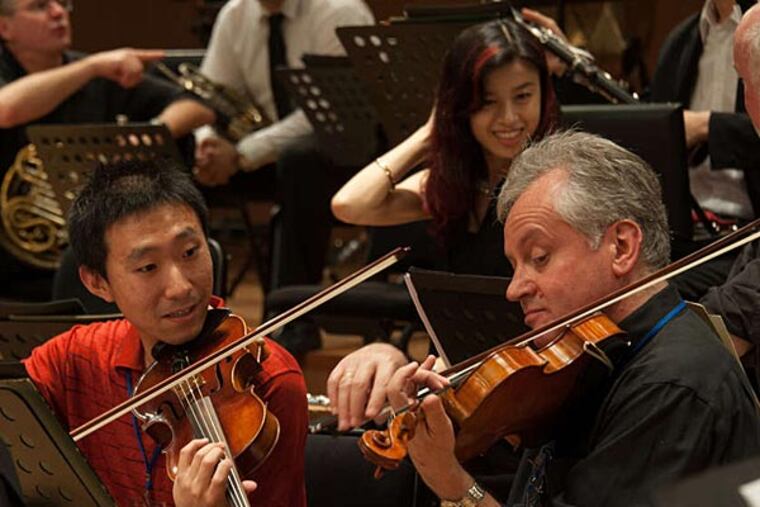Philadelphians reach across East-West divide
SHENZHEN, China - The earnest young Chinese woman asked the question with a directness uncharacteristic of her world: How do you learn to appreciate Western classical music?

SHENZHEN, China - The earnest young Chinese woman asked the question with a directness uncharacteristic of her world: How do you learn to appreciate Western classical music?
She had come to the right place on Wednesday: an open, practical dialogue about symphony orchestra conducting featuring Philadelphia Orchestra associate conductor Cristian Macelaru.
His reply: "You don't need to understand anything more than that it's beautiful. Allow yourself to be moved by the same things that move you in Chinese music."
Knowingly or not, they were confronting the lingering barrier between Chinese and Western musicians and their respective audiences. Though the two musical hemispheres seem diametrically opposed - the Chinese quiet and spare, the Western given to extravagant heroics - they've been successfully melded at least as far back as Puccini's 1926 opera Turandot, which incorporated Chinese folk songs into its thick Italianate upholstery.
Geographic barriers have been erased by Western-style classical orchestras being formed and cultivated all over China. But the Philadelphia Orchestra's emphasis during its 2014 tour of Asia and China residency is placing Philadelphians side by side with local musicians. The benefits go both ways, in a country that's producing great numbers of classical musicians of wildly varying quality.
"There seems to be a barrier between what they feel in their hearts and what they express in their instruments," said Philadelphia Orchestra violist Marvin Moon, who is of Korean heritage, after conducting a master class Tuesday in Changsha. "There seems to be a wall there. And it's hard for them to get over that wall."
When assistant principal bassist Joe Conyers had his Changsha student sing the music before playing it, he discovered that, with the Chinese, singing and playing seem to come from different places. Moon wasn't surprised: "Singing is probably the most natural way to express anything. But having to do that through an instrument, you have to think of how a singer would sing it and then, through your technical ability, get that out of your head and into your instrument."
During a joint concert with the Philadelphians and the Shanghai City Symphony on Monday, Macelaru was astonished to hear how the Shanghai orchestra, made up mostly of students and senior amateurs, played like two completely different ensembles depending on the piece - Verdi's overture to La Forza del Destino, or Butterfly Lovers Violin Concerto by He Zhanhao and Gang Chen.
"The Verdi was very mechanical," Macelaru said. "Then they started playing the Butterfly Lovers, and it was a different orchestra. Everybody started moving onstage to the music. They were wearing their hearts on their sleeves."
Basic concepts of ensemble are different here. For instance, the Philadelphians have a sort of auto-correct mechanism that kicks in the minute playing starts to go awry, while the Shanghai musicians take longer to find their way back from lapses. Yet other tour collaborations have felt effortless - with Chinese colleagues who recently graduated from Indiana University.
The equation went in various directions when Intercultural Journeys, an unofficial orchestra subgroup that mixes nationalities, rocked a few boats on Shanghai's popular Sunday-morning Weekly Radio Show, which normally hosts traditional classical music, both Western and Eastern.
This time, three of the orchestra's musicians - cellist Ohad Bar-David, clarinetist Ricardo Morales, and timpanist Don Liuzzi - were joined by the celebrated Shanghai musician Jiebing Chen, who plays the erhu, a bowed two-string spike fiddle. She played what's normally the violin solo in Massenet's Meditation from "Thaïs" with great expressivity, while Liuzzi let out a war whoop during a Nebojsa Jovan Zivkovic piece, The Gods of Rhythm for Djembe and Voice, which combined African rhythm and Serbian plain chant.
The repercussions were immediate: The group was offered a national tour of China.